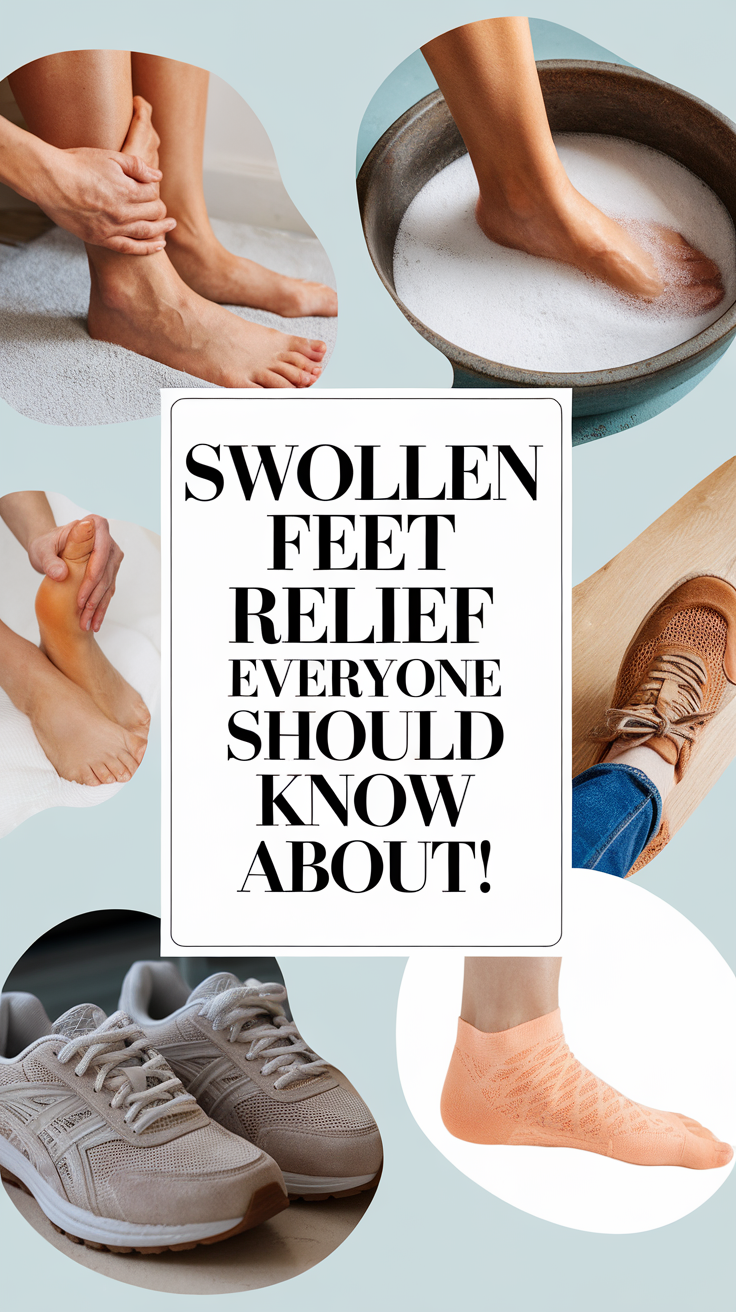Swollen Feet Relief Everyone Should Know About!
If you’re dealing with swollen feet, relief is closer than you think. Start by elevating your feet on a pillow to reduce swelling and improve circulation. Try soaking them in warm water mixed with Epsom salt for added relaxation. Staying hydrated helps flush out excess sodium, while regular exercise can prevent fluid buildup. Avoid high-sodium foods and wear comfortable shoes for better support. If swelling persists or worsens, don’t hesitate to consult a healthcare professional. There are plenty more tips and remedies to explore that can enhance your comfort and well-being.
Common Causes of Swollen Feet
Swollen feet can often signal various underlying issues, so it’s important to understand the common causes.
One frequent culprit is fluid retention, which can occur due to prolonged standing or sitting. You might also experience swelling from injuries or sprains, as your body responds to inflammation.
If you’ve been indulging in salty foods, excess sodium can lead to water retention, causing your feet to swell. Certain medical conditions, like heart, liver, or kidney problems, can contribute too.
If you’re pregnant, hormonal changes can also result in swelling. Lastly, medications, especially those for high blood pressure or anti-inflammatory drugs, may cause fluid accumulation.
Recognizing these causes can help you address the issue effectively.
Effective Home Remedies
If you’re looking for effective ways to alleviate swollen feet, several home remedies can help. These simple solutions are easy to implement and can provide relief right at home.
-
Elevate your feet: Prop them up on a pillow to reduce swelling.
-
Soak in Epsom salt: Dissolve a cup in warm water for a soothing soak.
-
Drink plenty of water: Staying hydrated helps flush out excess salt from your system.
-
Apply cold compresses: Use them for 15-20 minutes to numb swelling and reduce inflammation.
Lifestyle Changes for Relief
Making some key lifestyle changes can significantly help reduce swelling in your feet. Start by staying active—regular exercise promotes circulation and prevents fluid buildup. Pay attention to your diet; reducing salt intake can minimize water retention. Staying hydrated is equally important; drinking enough water helps your body balance fluids effectively.
Here’s a quick guide to help you:
| Change | Benefit | Tip |
|---|---|---|
| Exercise | Boosts circulation | Aim for 30 mins daily |
| Reduce sodium | Minimizes water retention | Limit processed foods |
| Stay hydrated | Balances body fluids | Drink 8-10 cups daily |
| Wear comfortable shoes | Reduces foot pressure | Choose supportive footwear |
Incorporate these changes, and you’ll likely notice a difference!
Importance of Elevation
Elevating your feet is a simple yet effective way to alleviate swelling and promote better circulation. When you raise your feet, gravity helps reduce fluid buildup, making you feel more comfortable.
Here are some benefits you’ll notice:
- Reduces swelling and discomfort
- Improves blood flow to your lower limbs
- Helps prevent future swelling episodes
- Offers relaxation and relief after a long day
Try to elevate your feet for 15 to 30 minutes a few times a day. You can use pillows or a footrest to get them higher than your heart.
Best Exercises for Circulation
After you’ve taken the time to elevate your feet, incorporating exercises that boost circulation can further enhance your comfort and well-being. Here are some effective exercises you can try:
| Exercise | Duration | Benefits |
|---|---|---|
| Ankle Pumps | 10-15 reps | Improves blood flow |
| Toe Raises | 10-15 reps | Strengthens foot muscles |
| Leg Lifts | 10-15 reps each leg | Enhances leg circulation |
| Seated Marching | 5-10 minutes | Increases overall mobility |
When to Seek Medical Advice
While most cases of swollen feet can be managed at home, knowing when to seek medical advice is crucial for your health.
If you experience any of the following symptoms, don’t hesitate to consult a healthcare professional:
- Swelling that lasts more than a few days
- Pain or tenderness in the affected area
- Redness, warmth, or fever accompanying the swelling
- Difficulty walking or standing
These signs may indicate a more serious underlying condition, such as a blood clot or heart issue.
It’s always better to err on the side of caution. Remember, your well-being is the top priority, and timely medical attention can make a significant difference in your recovery.
Don’t ignore your body’s signals!
Preventive Measures to Consider
Understanding when to seek medical advice helps you take charge of your health, but preventing swollen feet in the first place can save you from discomfort altogether.
Start by staying active; regular movement promotes circulation and reduces fluid buildup. Make sure you’re drinking enough water—hydration helps flush out excess salt that can cause swelling.
Pay attention to your diet; limiting sodium can significantly impact fluid retention. If you work at a desk, take breaks to stretch and elevate your feet.
Wearing comfortable shoes and avoiding high heels can also help. Lastly, consider compression socks to support your legs and improve blood flow.
Frequently Asked Questions
Can Certain Medications Cause Swollen Feet?
Yes, certain medications can cause swollen feet. If you notice this side effect, it’s important to talk to your doctor. They might adjust your dosage or suggest an alternative that doesn’t cause swelling.
Are Swollen Feet a Sign of Serious Health Issues?
Swollen feet can sometimes indicate serious health issues, like heart or kidney problems. If you notice persistent swelling, it’s essential to consult a healthcare professional to rule out any underlying conditions and ensure your well-being.
Is It Safe to Walk With Swollen Feet?
Yes, it’s generally safe to walk with swollen feet, but you should listen to your body. If you experience pain or discomfort, take breaks and elevate your feet to reduce swelling and improve circulation.
How Long Does Swelling Typically Last?
Swelling usually lasts a few days to a week, depending on the cause. If it persists longer, you should consult a doctor. They can help determine the underlying issue and recommend appropriate treatment.
Can Diet Affect Foot Swelling?
Yes, your diet can definitely affect foot swelling. High sodium intake might cause retention, while foods rich in potassium can help balance fluids. Staying hydrated and eating a balanced diet is key to managing swelling.





